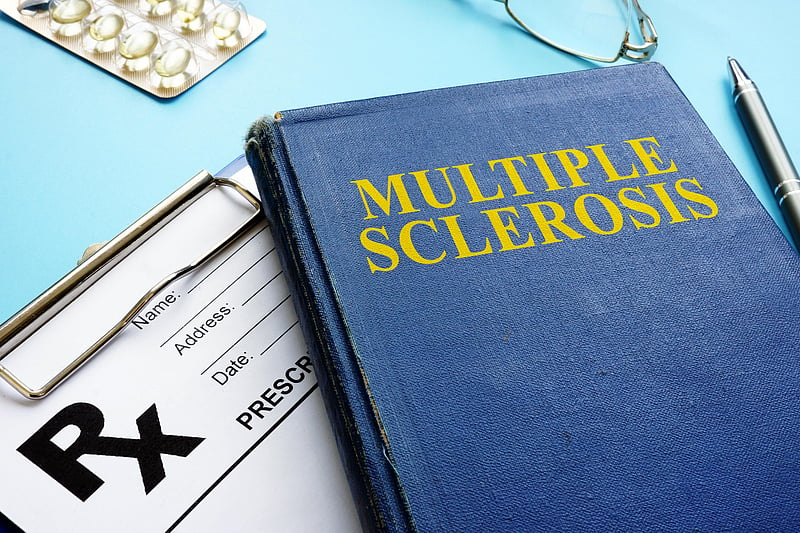Get Healthy!

- Posted July 14, 2022
Cancer Med Might Be Powerful Treatment for MS
A drug used "off-label" for multiple sclerosis (MS) is more effective than a standard medication at preventing symptom flare-ups, a new clinical trial has found.
The drug, called rituximab, is approved in the United States for treating certain cancers and autoimmune diseases. It is not approved for treating MS, but some doctors do prescribe it off-label for that reason.
That's based partly on how rituximab works, as well as some early-stage trials that suggested the drug reduces MS relapses, which are periods of new or worsening symptoms.
The new study from Sweden is the first phase 3 trial to test rituximab against MS -- the type of trial that is designed to prove a treatment's efficacy, said lead researcher Dr. Anders Svenningsson.
And it found that compared with an approved MS medication -- dimethyl fumarate (Tecfidera) -- patients given rituximab had a fivefold lower risk of relapse over two years.
"Our findings add the necessary data on clinical efficacy, in a trial designed for that purpose," said Svenningsson, chief physician of the neurology clinic at Danderyd Hospital in Stockholm.
That might be enough, he added, to get more authorities to recommend rituximab as an MS treatment, and more insurance companies to pay for it.
MS is a neurological disorder caused by a misguided immune system attack on the body's own myelin -- the protective sheath around nerve fibers in the spine and brain. Depending on where the damage occurs, symptoms include vision problems, muscle weakness, numbness and difficulty with balance and coordination.
Most people with MS have the relapsing-remitting form -- where symptoms flare for a time, then ease. Over time, the disease steadily worsens.
Immune system cells called B-cells seem to play a key role in MS. That understanding led some doctors to start prescribing rituximab to MS patients, as the drug depletes the number of B-cells in the blood.
But research went in a different direction, with drug companies developing new B-cell-depleting drugs. One, called ocrelizumab (Ocrevus), was approved in the United States in 2017. A second -- ofatumumab (Kesimpta) -- followed in 2020.
Both Ocrevus and rituximab require patients to go to a medical facility for infusions every six months. Kesimpta, on the other hand, is taken at home once a month, with an auto-injector.
But an advantage of rituximab is cost. It's available as a generic, and is priced far lower than the two newer drugs, Svenningsson said.
The new findings, published online July 13 in the journal Lancet Neurology, are based on 195 Swedish patients with relapsing-remitting MS. Nearly all were newly diagnosed and not received any treatment.
The researchers randomly assigned each patient to take either rituximab or dimethyl fumarate -- a pill that eases inflammation caused by MS. Patients on rituximab received infusions every six months, while those on dimethyl fumarate took the medication twice a day.
Over two years, 16 of 97 patients on the pill suffered a relapse, versus only three of 98 patients taking rituximab. MRI scans showed that rituximab patients also had fewer MS "plaques" -- areas of damage to tissue in the central nervous system.
Because B-cells are responsible for churning out immune system antibodies, a main safety concern with any B-cell-depleting drug is infection. In this trial, only two rituximab patients developed a serious infection, such as pneumonia -- as did one patient on the oral drug.
The results came as no surprise to a U.S.-based neurologist who was not involved in the trial.
"Rituximab has been used off-label as a highly effective disease-modifying therapy for relapsing-remitting MS," said Dr. Nada Abou-Fayssal, director of the Multiple Sclerosis Center at NYU Langone Hospital-Brooklyn.
She said the trial further validates the role of rituximab in treating the disease.
Abou-Fayssal agreed that rituximab's relatively low cost is a positive. But she also cautioned that compared with the newer B-cell-depleting drugs, rituximab is more likely to cause infusion reactions.
Those reactions, caused by an immune system response during or soon after an infusion, can include symptoms like hives, swelling and breathing difficulty. Of patients in this trial, 41% had an infusion reaction.
In the United States, there are many medications approved to treat MS and there is no one-size-fits-all strategy, according to Abou-Fayssal.
For any one patient, she said, the decision is based on various factors -- including disease severity and patients' overall health, lifestyle and comfort with the potential side effects of a given drug.
Because the patent on rituximab has expired, there is no financial incentive for a company to seek its formal approval for MS, Svenningsson noted.
But, he said, this trial provides the kind of evidence needed for an approval -- which might persuade authorities in more countries to recommend rituximab as an MS treatment option.
Svenningsson noted that in Sweden doctors can prescribe approved drugs off-label. But many other countries do not allow that if there are "on-label" options available.
The trial was funded by the Swedish Research Council.
More information
The National Multiple Sclerosis Society has more on treating MS.
SOURCES: Anders Svenningsson, MD, chief physician, neurology clinic, and adjunct professor, Department of Clinical Sciences, Danderyd Hospital, Karolinska Institute, Stockholm, Sweden; Nada Abou-Fayssal, MD, associate chief, department of neurology, and director, Multiple Sclerosis Center, NYU Langone Hospital-Brooklyn, New York City; Lancet Neurology, July 13, 2022, online






